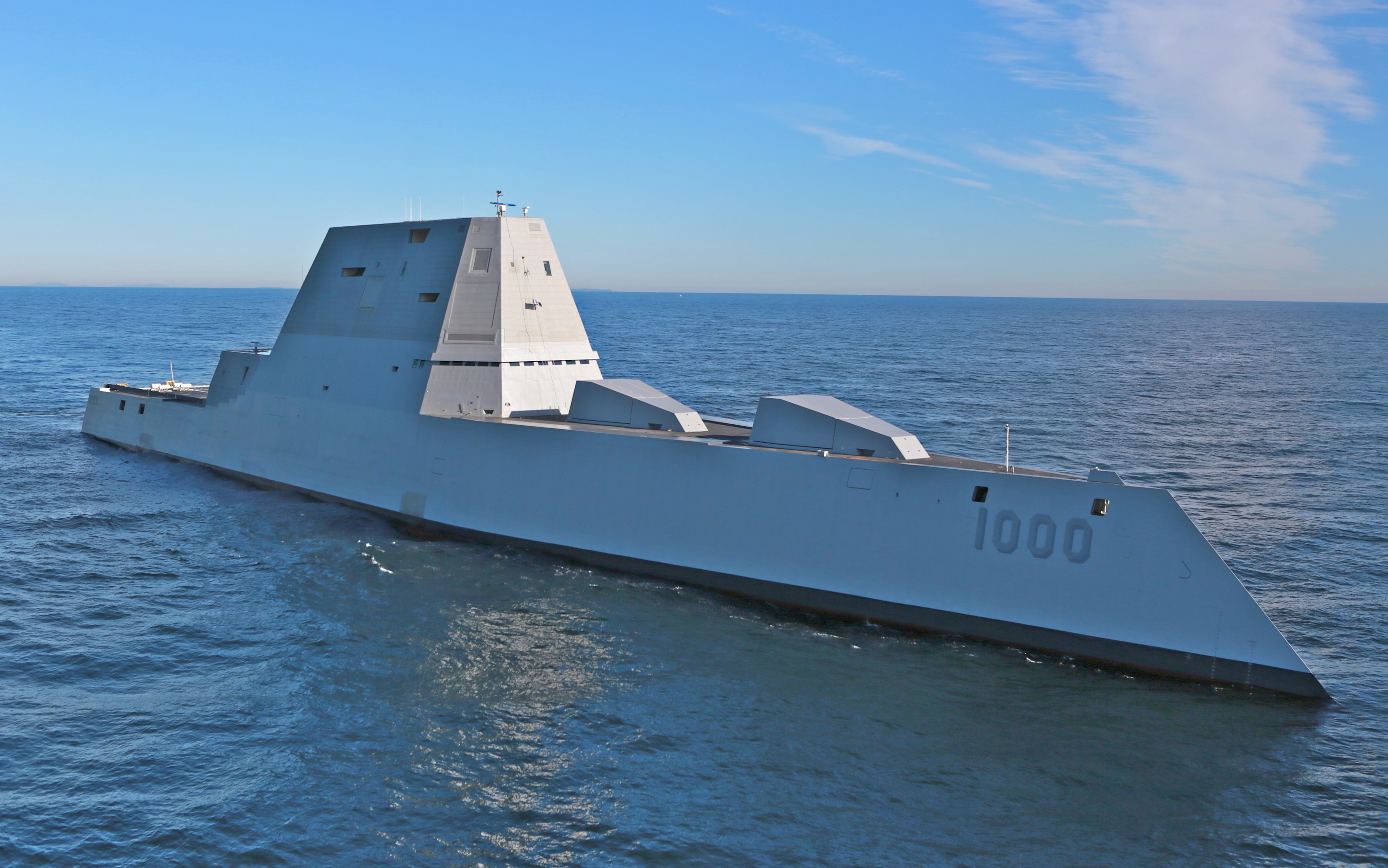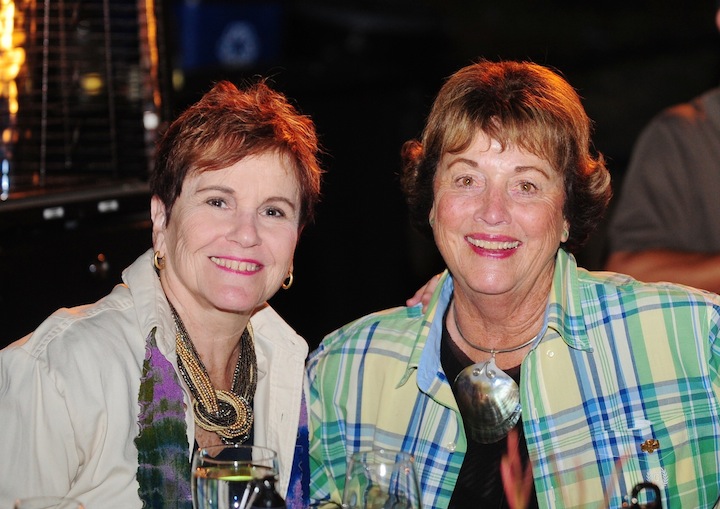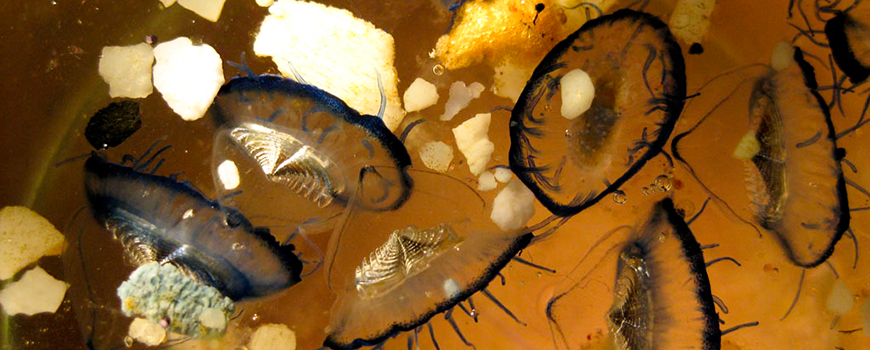Daily Business Report-Oct. 17, 2016
Scientists aboard the 2009 SEAPLEX voyage collected small invertebrates called vellela and the plastic bits they lived among. (Credit: UC San Diego)
Researchers: Tiny Bits of Plastic Trash
Pose Threat to Marine Life and Humans
Seabirds with plastic bottle caps and straws in their gut and massive fishing nets drifting like ghosts in remote parts of the ocean are graphic reminders of where plastic trash can end up. Yet according to scientists, tiny plastic particles nearly invisible to the naked eye pose the largest threat to marine life and humans.

Researchers at Scripps Institution of Oceanography at the University of California San Diego are studying these microplastic particles found floating across the world’s ocean to understand how old they are, where they originated, and how they might move up the food chain into humans. The science behind the plastic trash could help with efforts to reduce plastic pollution reaching the ocean.
“One plastic bottle eventually disintegrates into many tiny pieces that can be eaten by anything,” said Scripps PhD student Jennifer Brandon. “The real problem in the ocean is happening at a very small scale.”
Scientists estimate that 90 percent of the marine plastic in the world’s oceans is less than a centimeter in length, and that five trillion pieces of plastic are currently in the ocean, with an estimated 4.8 to 12.7 million metric tons more entering every year.
In a recent study supported in part by UC Ship Funds and the National Science Foundation, Brandon and former Scripps PhD student Miriam Goldstein experimentally weathered pre-production plastic pellets used to make a wide range of plastic products. They set up experiments to simulate three real-world weathering conditions: a dry/sunlight sample to replicate shoreline conditions, sunlight/seawater to mimic the ocean surface, and seawater/darkness to imitate plastic sitting on the seafloor to better understand how long ocean plastics have been lost at sea.
_______________________

SDSU Selected for Initiative to Improve
Training for Aspiring School Principals
San Diego State University has been selected to participate in a national $47 million initiative to improve programs that train aspiring school principals. The grant from the New York-based Wallace Foundation will bring $6.2 million to SDSU over the next four years.
The grant will allow SDSU researchers to examine state policy and determine which procedures might be strengthened for higher quality training. The Wallace Foundation will capture the lessons from SDSU and the other participating universities and share them with policymakers and practitioners across the country.
“The support from the Wallace Foundation will allow SDSU faculty and their district partners to continue to refine and improve principal preparation,” said Doug Fisher, chair of the Department of Educational Leadership. “This will eventually provide thousands of students in San Diego County with school leaders who understand the complexities of leading a school and can hit the ground running. Our collaboration will directly impact students’ learning in the K-12 systems all over San Diego.”
SDSU will form partnerships with the San Diego Unified School District, Chula Vista Elementary School District, and the Sweetwater Union High School District. In exchange for SDSU’s commitment to train future principals, the school districts will hire the program’s graduates.
Read more…
_______________________

USS Zumwalt Christened Before
Heading to Homeport in San Diego
The Navy’s newest and most technologically advanced warship, USS Zumwalt was commissioned into active service Saturday at North Locust Point in Baltimore before heading to homeport in San Diego.
Zumwalt, the lead ship of a class of next-generation multi-mission destroyers, features a state-of-the-art electric propulsion system, wave-piercing tumblehome hull, stealth design, and the latest warfighting technology and weaponry available.
Secretary of the Navy, the Hon. Ray Mabus, delivered the ceremony’s principal address. “This ship is an example of a larger initiative to increase operational stability and give the U.S. a strategic advantage,” said Mabus.
The ship is named in honor of Adm. Elmo R. “Bud” Zumwalt Jr., former chief of naval operations from 1970 to 1974 and a veteran of World War II and the conflicts in Korea and Vietnam.
The Zumwalt-class is much larger than today’s destroyers, fielding a considerably larger flight deck and aviation facility-space to operate with F-35 Joint Strike Fighters, MV-22 Ospreys and unmanned systems to execute a wider array of surface, aviation and undersea missions that deliver more manpower, firepower and computing power.
The ship will be crewed by 147 officers and enlisted personnel and a 28-person aviation detachment. Capt. James A. Kirk, commanding officer of Zumwalt.
_______________________
San Diego Women’s Chorus Hires
Assistant to the Artistic Director

The San Diego Women’s Chorus has hired Celeste Oram as the new assistant to Artistic Director Kathleen Hansen.
Oram will work directly with Hansen to provide musical support to the growing choral organization, assisting with rehearsing, conducting and concert production duties.
Oram is a composer and musician hailing from New Zealand and based in San Diego since 2014. Inaddition to her new position with the San Diego Women’s Chorus, she is currently pursuing a doctorate in music composition at UC San Diego, where she completed her Masters of Music earlier in 2016. She is a singing member of Pro Arte Voices and the La Jolla Symphony Chorus, where she also acts as production assistant.
Previously, in New Zealand, she conducted and directed opera and musical theater productions with community and student groups. Her compositions have been performed by orchestras and ensembles in Europe, the United States, New Zealand and Australia.
Oram will make her debut with the San Diego Women’s Chorus at its Everything She Touches concert on Nov. 19 and 20. Tickets are now on sale at www.sdwc.org.
_______________________
UCSD Neuroscientist Awarded $2 Million
For Research Under BRAIN Initiative
Four teams of neuroscientists at the University of California San Diego have been awarded a total of $2.27 million from the National Institutes of Health to continue their research under President Obama’s BRAIN Initiative.
Obama launched the Brain Research through Advancing Innovative Neurotechnologies, or BRAIN, Initiative in 2014 to equip researchers with the insights into basic neurobiology that form the underpinning to treat a wide variety of brain disorders such as Alzheimer’s, schizophrenia, autism, epilepsy and traumatic brain injury.
In the three years since the initiation of the BRAIN Initiative, the four UC San Diego teams have been awarded more than $6 million under this effort, underlining the university’s leadership role in basic neuroscience research with the potential to improve our understanding and treatment of brain disorders.
UC San Diego neuroscientists are also being funded by Cal-BRAIN, a state-funded program that complements the federal BRAIN Initiative by providing additional support for research efforts in California that will speed development of new brain technologies, or “neurotechnologies.”
_______________________
Cubic and University of Melbourne to
Deliver World’s First ‘Urban Laboratory’
Cubic Transportation Systems, a business unit of Cubic Corporation, and the University of Melbourne announced a partnership on the development of a National Connected Multimodal Transport (NCMT) Test Bed, which will deliver the first implementation of Cubic’s Surface Transport Management Solution worldwide.
The NCMT Test Bed will be the world’s first urban laboratory capable of large-scale testing and implementation of emerging technologies in complex urban environments. The testing will explore ways to relieve pressures created by population growth and traffic increases by using data from traffic, public transportation and parking. The NCMT Test Bed will also focus on multimodal transportation systems consisting of connected vehicles, roadways, freight, city logistics, public transportation, smart stations, pedestrians and cyclists.
“Our transportation infrastructure is under severe pressure and this is only going to increase. Governments need to make operations more efficient, while allowing customers to easily connect with all the services and infrastructure we have created,” said Tom Walker, senior vice president and managing director, CTS Asia-Pacific. “To achieve this, cities need to take advantage of the massive amounts of data currently at their fingertips and realize new opportunities to connect different systems and create a level of higher intelligence about the system as a whole.”
_______________________
City May Lease Old Sempra
Building for Operations Center
By City News Service
The former Sempra Energy headquarters in Downtown San Diego could be taken over by the city under a proposal to be taken up today by the City Council.
Staff proposes that the city enter into a 20-year lease-to-own agreement, after which the municipal government would take title to the 19-story office tower at 101 Ash St.
City officials said at a previous meeting that the plan would be to move employees out of the City Operations Building, where architects and builders take their plans for approval and permits. The fate of the aging structure, which includes Fire Station 1, hasn’t been determined, but it’s said to be in dire need of renovation or replacement.
By contrast, the Sempra tower was reported to be in good condition, with an estimated usable life span of at least 40 years. The building is owned by Manchester Financial Group.
The city might also move employees from another leased office building on Second Avenue, according to a staff report.
For the former Sempra building, the city would pay total rent of about $202 million over the 20-year period and receive a $5 million tenant improvement allowance, the report said. Staff said the proposed arrangement would save the city $44 million in rental costs over the next two decades.
Sempra moved into its current headquarters in the East Village last year.
_______________________

Patti Roscoe Awarded Courage, Confidence
and Character Award from Girl Scouts
During its recent Volunteer Celebration at the San Diego Convention Center, Girl Scouts San Diego presented a Courage, Confidence and Character award to Patti Roscoe of Mission Hills. Other local honorees included Community Partner Award recipients Mike Hess Brewing and Chelsea’s Light Foundation.
Roscoe, a prominent community leader and longtime Girl Scout supporter, is renowned for her organizational effectiveness, widespread connections, generosity and volunteerism. She leverages all of those qualities to benefit Girl Scouts San Diego.
Roscoe’s first foray in business was selling Girl Scout Cookies in Buffalo, N.Y. Later in life, she came to realize that her extensive marketing, finance and product management skills stemmed from her Girl Scout leadership experiences.
Roscoe founded PRA Destination Management Company in 1981. In the mid-nineties, she franchised her five Southern California offices and by 2007 had expanded the operation to 17 locations. At the end of that year, she sold her company to a European organization.
Together with her life partner Jim Tiffany, Roscoe has contributed to the success of numerous Girl Scout fundraisers and campaigns — from last month’s “Urban Glampout” fundraiser to capital campaigns to improve and expand program and camp properties.
Most recently, Roscoe and Tiffany funded a state-of-the-art kitchen for the new lodge at Girl Scouts San Diego’s Balboa Park headquarters.



